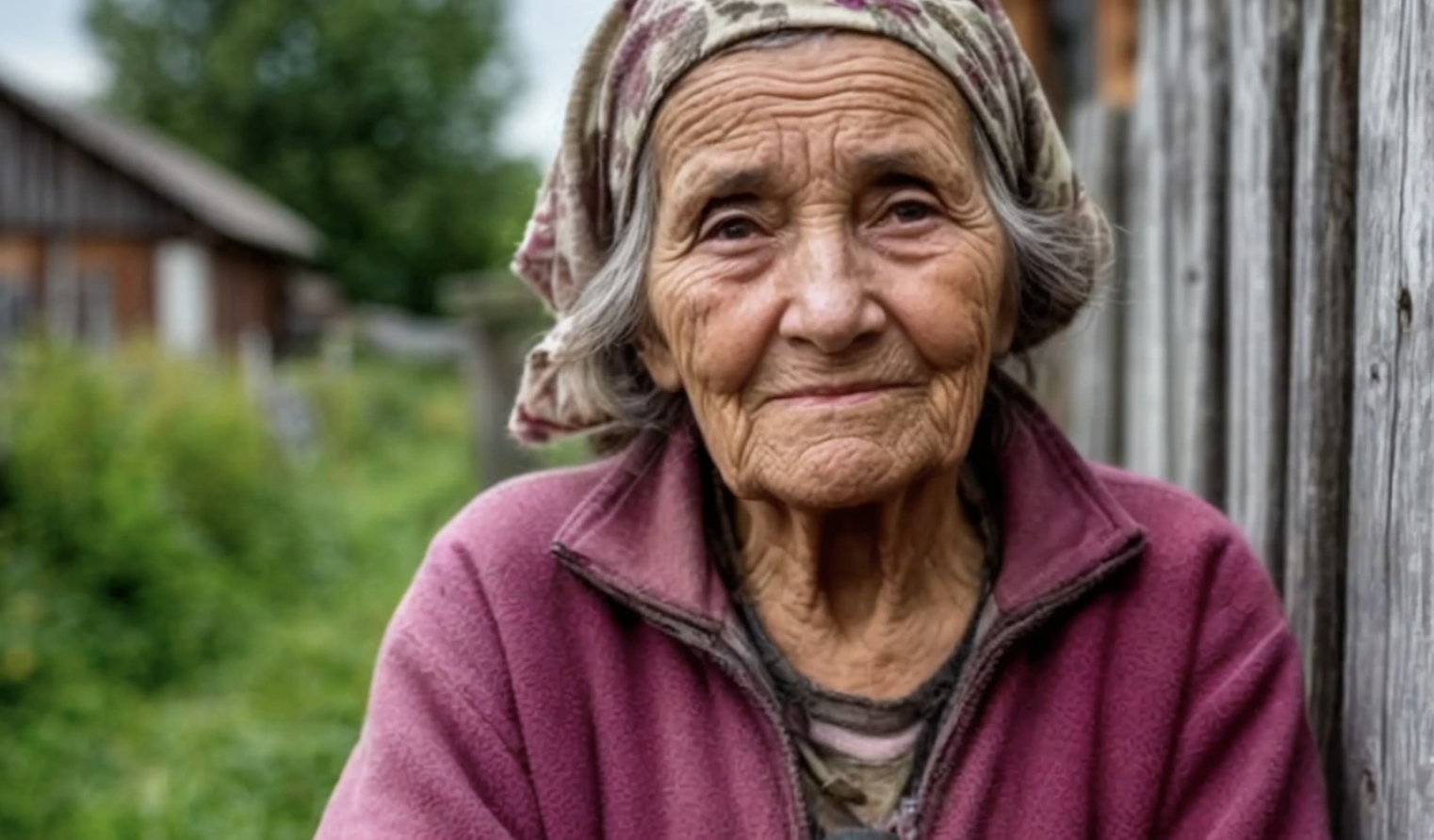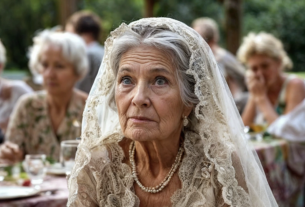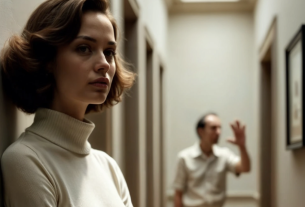Nadezhda, who had just turned 72, had lived her entire life in the village. For many years, she worked in the poultry house, where the grueling physical labor and endless household chores gradually wore down her health. In her old age, the woman had completely lost her sight, unable even to distinguish the silhouettes or outlines of objects.
In her youth, Nadya had been eager to earn more money to improve her living conditions. There was no time left for a personal life. It wasn’t until she was 40 that she realized finding a life partner would now be extremely difficult: most of the village men were already married, some had fallen into alcoholism, and others had left for the city in search of a better fate.
However, fate brought her together with Evgeny—a tractor driver with whom she had worked side by side on the farm for many years. One day, Nadezhda looked at him with different eyes. A romance blossomed between them. But the man proved unreliable: he often disappeared with his friends, getting drunk until he lost all memory. For a year, he toyed with her, unwilling to commit to anything serious or to give up his harmful habit for the sake of family. Tired of his indecision, Nadezhda was ready to break off the relationship. Yet, as it often happens, he beat her to it and disappeared on his own. Nadezhda decided that she was lucky.
Later, she learned that she was pregnant and chose to keep this news from Zhenya. A few months later, he ended up in his own home after yet another binge with his irresponsible friends. And Nadezhda gave birth to a son, Maximka.
From his first months of life, the boy showed a headstrong character. Nadezhda found it hard to manage such a lively and stubborn child who demanded constant attention. Already in primary school, she was regularly called in for meetings to discuss her son’s behavior. Maxim was insolent and refused to listen to anyone. There were no role models in his life, and he perceived his mother’s reproaches as empty sounds. Because of his fearlessness, the young man constantly got into trouble, testing both his mother’s patience and her heart.
When Maxim became a teenager, Nadezhda shed many tears, hoping that he would come to his senses and change. She often had to meet with the local policeman, who threatened to take serious measures with the boy. At the age of 20, Maxim told his mother that he was leaving for the North to work on a shift basis. Nadezhda tried to dissuade him, but she knew it was useless.
The young man made three trips back and forth, and then he disappeared. Nadezhda’s friend, Valentina, frequently visited her to offer comfort: “Your Maxim will come back, where else can he go? Maybe he met a girl there and decided to stay.” “No, it’s something else here,” Nadezhda replied through tears. “I know him; nothing just happens to him. At least let him come back healthy. I’m beside myself.” But the years passed, and there was no word from Maxim. Nadezhda placed advertisements in newspapers, reached out to hospitals, and tried to find him through his colleagues and the company where he worked, but all in vain.
Ten years went by. During that time, Maxim never once gave any sign of life. From the heavy labor and constant worry, Nadezhda finally lost her sight completely. Her faithful companion became a large dog named Polkan, who never left his mistress’s side.
Three years ago, Valentina passed away, and Nadezhda was left alone with her grief. She had no one else to support her. In their isolated village, new people appeared only rarely. The elderly died, and the youth left for the city. There were no more than ten inhabited yards left. And so, Nadezhda spent her remaining days in an old house on the outskirts.
Zlata, a young postwoman of 24, treated the blind old lady with warmth and often visited her, even when it was beyond her official duties. Nadezhda did not receive newspapers or magazines anymore, as she could no longer read. She only listened to the radio or watched television. Zlata ran errands for groceries, helped around the house, and sometimes read books or magazines aloud.
“Leonidovna!” cried the neighbor, Sveta. “Be careful! They say some realtors have appeared, circling around, scouting things out. Before you know it, they’ll start evicting us!” “What do you mean? What do they need?” the old woman asked in alarm. “They’re planning to build something. Either summer cottages for the rich or a recreation center. I’m not exactly sure, but be on your guard. And don’t let anyone into your home. If need be, call me and I’ll send my son over.” “Thank you, I’ll keep that in mind. I won’t sell this house. I was born here, and I will die here. I don’t need the hassle of moving. I want to live in my hometown.”
A few days later, someone knocked on Nadezhda’s door. She asked, “Who’s there?” but received no answer.
The old woman opened the door, ready to chase off the developers with her broom. But standing on the doorstep was a young man who introduced himself as her son! “Maximka!” she gasped. “Where have you been? Let me give you a hug.”
Nadezhda held her son tightly, weeping. Though she could not see his face, she traced its contours with her hands and ran her palms over his hair. “Mommy, can’t you see me at all?”
Her son’s voice sounded to Nadezhda a bit changed. He had grown up. Eleven years had passed. Who knew how much he might have changed during that time? Only his character remained the same—confident and bold. Maxim began to explain why he had been gone for so many years: “I got caught up in a mess. My bosses turned out to be crooked, and there were guys from different regions all around. The area was isolated, and there was no help to be found. I had to work hard just to get out. Honestly, they didn’t let me go. But now it’s all behind me. I’m home, and I’m not going anywhere,” he reassured his mother.
At first, Nadezhda was overjoyed at her son’s return, but soon his behavior began to change. He started disappearing again, coming home drunk, even drinking in the morning. Sometimes his friends would drag him to the porch, and sometimes the local policeman would drop by for an explanatory talk.
“I don’t know what to do with him,” the old woman lamented in a conversation with Zlata. “He seems like a different person. He no longer respects me.” “Maybe he’s seen so much during these years that he couldn’t come back earlier,” the young woman replied softly. “Talk to him, ask him to be more calm.”
Nadezhda took the advice and decided to discuss her worries with her son. But he was rude and refused to listen to her complaints. “You have no idea what I’ve been through all this time! Yes, I’ve changed. So what? I’m a grown man now. Why are you nagging me?” he exploded. “Keep an eye on me, if you want to, so I don’t get into any trouble.”
“Why are you so worked up, son? I mean to say that you can’t keep living like this. You might get into trouble, and with my meager pension, I won’t be able to help you get out of it. Have some mercy on your mother’s heart—I’m at a loss when you leave at night.” “None of your business! I’m the master of my own fate,” Maxim snapped, and the conversation ended there.
Nadezhda couldn’t calm down. Doubts tormented her: what if her son had been replaced? She could not believe that her mischievous yet loving son could speak to her so rudely and disrespectfully. Unable to see with her eyes, she tried to “see” with her heart, but she knew that her suspicions were nothing more than guesses. In the village, there was no one left who remembered her Maxim. No one could confirm whether this was truly him or not.
The old woman was afraid to raise the issue, fearing gossip. She did not want to be shamed in her old age, and who knew—perhaps she might be accused of senility for not recognizing her own son?
Meanwhile, the man began actively meeting with realtors, discussing something with them.
“Son, dear, who are you always whispering with? Perhaps you’ve even found a fiancée? At least bring her, show her to me,” Nadezhda said, trying to hide her anxiety.
“You, mother, should stay out of my business, or who knows what might happen. You can’t see anything, but I see. It would be better if you kept your distance. Mind your own affairs, or you might end up in the hospital prematurely, or even not at home at all.”
These words frightened Nadezhda to the depths of her soul. She understood that she had no one to help her. And what could she say? As long as her son had not committed any crime, there was nothing she could do. It pained her deeply to realize that she was old and helpless, unable to think of a way out of this situation.
The only person she trusted was Zlata. The young woman genuinely empathized with the old lady. “I don’t know what to do about him. I’m scared to stay alone with him in the house. I can’t see, and I can’t stand up to him. He’s not like my Maximka at all. My Maximka would never speak to his mother like that. But how can I be sure if it’s him or not?”
“Give me his old photographs, I’ll compare them,” suggested Zlata.
“I wanted to find them, but he said he had burned them. He claimed he was cleaning out the shed and burned all sorts of junk. Then I rummaged through the wardrobe for the family album—but everything was turned upside down, and things weren’t in their proper places.”
One day, Nadezhda received a call from an unknown number. Zlata was nearby and overheard the conversation.
“Hello, Nadezhda Leonidovna. This is the local policeman calling.” “What happened? Did Maxim do something?” the woman asked in distress. “No, but it’s urgent. Please come immediately.” Zlata volunteered to accompany the old lady to the station. There, they were told a shocking story: a young man, who outwardly resembled Nadezhda’s son, had been found enslaved by criminals in the North. This man confidently claimed to be her son. “He gave the exact address, his personal details, your year of birth, your maiden name, even the street of the village and the names of those who lived on it in his childhood,” the policeman explained. “My God! Is it really true? I always felt that that man wasn’t my Maxim. Where is my boy? What happened to him? Why was he gone for so long?” the old lady wept, clutching a glass of water. Zlata had already given her a sedative to prevent a heart attack. “Your Maxim was turned into a slave. They took his passport and money, and forced him to work for free. The enterprise was located in an isolated area. This sometimes happens, and only a few manage to escape. Thanks to your son, we will be able to rescue other people. He is very strong and brave. You, Nadezhda Leonidovna, can be proud of him.” “Then who is living in my house? Who is that scoundrel?”
The police immediately launched an investigation. Help arrived from the city, understanding that the case could take a serious turn. Alexander, who had introduced himself as Nadezhda’s son, turned out to be a fraudster who had planned to seize her house by taking advantage of her blindness.
The news spread throughout the village in an instant. All the newspapers carried the story on their front pages. Reporters arrived to interview Nadezhda, Alexander, and anyone who could provide useful details for their report.
And the old lady felt relief. Her heart had not deceived her—she knew that something was amiss.
Following the investigation, Alexander was exposed as a fraudster, his scheme was uncovered, and he was arrested. He had planned to sell Nadezhda’s house to developers, caring nothing for the fate of the blind old woman.
And then, the real Maxim returned to the village. He rushed to his mother and fell to his knees before her. “Mommy, dearest…” He kissed her hands. This time, Nadezhda did not cry. Now she was certain: this was her son. “I was afraid I’d never hear your voice again, my little boy.”
Maxim was severely weakened by his long captivity, poor nutrition, and hard labor. He spoke little about what had happened to him. It was too painful to recall, and he did not want to trouble his mother further. “I didn’t know you were alone here. How did you manage, Mommy?” “I wasn’t alone. Zlata helped me. She is such a kind and good girl. She never asked for anything in return, but was always ready to help.”
Maxim immediately noticed the young woman. She had supported Nadezhda when she heard the sound of her son’s footsteps. Zlata continued to help the family and care for the ailing man. He recovered quickly. She was not afraid of his past. In time, feelings grew between them, and they began dating. Their romance was met with approval by the villagers, who predicted a swift wedding for the young couple. And so it happened. Soon, Nadezhda blessed the children’s marriage and became the happiest person in the world. She lived to see these years, waited for her son, and gained a wonderful daughter-in-law. Maxim told his mother that he wanted to renovate the family home and take care of the estate. Nadezhda rejoiced in every day spent with her family and wished them nothing but happiness and good fortune.



